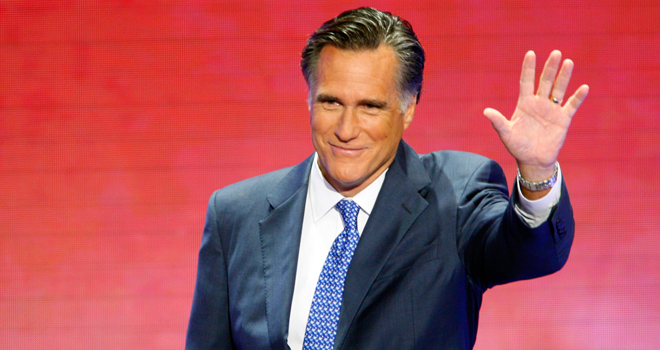The results are all in and Mitt Romney’s prodigious fundraising has erased any doubts that, for all his weaknesses, the former Massachusetts governor is the only true frontrunner in the GOP primaries.
The Romney campaign’s $18 million quarter easily overshadows rivals like Tim Pawlenty ($4.2 million) and Michele Bachmann ($4.2 million, about half from her Congressional campaign). But there is a cloud to the silver lining: Romney’s cash advantage is overwhelmingly powered by big-money donors.
Only 6% of Romney’s haul came from donations under $200, according to a New York Times analysis, while a whopping 70% of the money came from donors who contributed the max $2,500, meaning they can no longer legally donate any more until the general election. It’s a far cry from Bachmann, who raised 67% of her total from donations under $200 and 6% from max contributors.
Obviously it’s far better to have big donors on your side than backing someone else, but as Hillary Clinton discovered in the primaries the last time around, they’re no substitute for a grassroots operation that can donate smaller amounts over and over and over. In that contest, Clinton and Obama fought to a stalemate on fundraising through 2007. But as the campaign dragged on for months and months, Obama ran up a huge cash advantage thanks to a wave of small donations while Clinton fell into debt, in part because many of her core supporters had already hit their limit.
Jonathan Mantz, Clinton’s finance director in 2008 and current Managing Director at BGR Government Affairs, told TPM that Romney may have to expand his donor base or else risk a tough challenge from one of the more populist contenders, like Bachmann or Ron Paul, who have a loyal base of small donors.
“If they catch fire, they can really deliver a movement,” Mantz said.
He added that while Romney’s early numbers were important in establishing his credibility, there’s no substitute for a broader donor base in the long run that can lend momentum at the right time. While Clinton was eventually overwhelmed by Obama, Mantz noted was her own grassroots operation that let her remain competitive even as the contest dragged on. After she hit a fundraising wall and had to contribute $5 million of her own wealth to the campaign in February, her supporters rallied to help keep her in the race against the surging Obama. He noted a similar phenomenon among Obama’s supporters after he lost New Hampshire, who reacted to the setback by powering him to a record-breaking $55 million take that month. Over 90% of the donations were under $100.
While Romney’s early numbers were crucial in establishing credibility, “he needs to invest in his grassroots communications…If you can’t, eventually everyone stumbles.”
Romney’s fundraising is not without considerable upside, however. For one thing, an unexpectedly large number of top donors are still undecided, giving him more room to grow his pool of wealthy backers. It’s not just the big bundlers either: small donors have yet to unite behind any one candidates and it’s possible they’ll bandwagon behind Romney if he solidifies his frontrunner status further.
“If he continues to do well in polling and in early contests, I expect more money would come in,” campaign expert and UC-Irvine professor Richard Hasen told TPM.
There still is a backup plan if the cash flow proves weaker than expected as well. Unlike candidates like Bachmann, Romney has an extremely wealthy supporter that he can turn to if needed: himself. He spent $35 million of his own money on his 2008 campaign, but has been loathe to use his own funds so far. If he hits a wall against one of his less wealthy opponents, like Pawlenty or Bachmann, he could be moved to reconsider his stance.
Finally, Romney supporters have an avenue by which they can lend unlimited support to their favored candidate if they decide to take more drastic action. Restore Our Future, an independent Super PAC loyal to Romney, has already collected $12 million and could collect spillover resources from donors who decide the max $2,500 for the primary just isn’t enough. No other candidate has a similar organization backing their campaign.
A representative of the Romney campaign declined to comment for this story.









